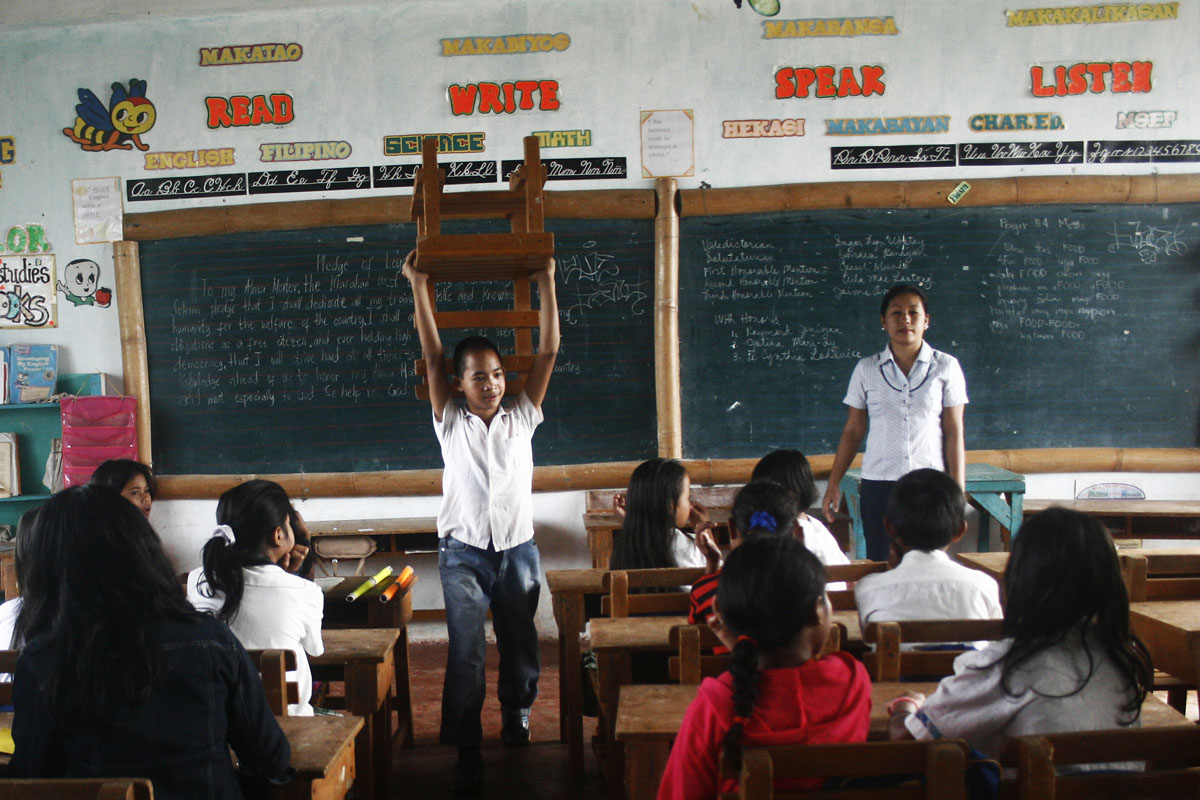 A Grade 6 pupil looks for a space in a crowded classroom in Marahan West Elementary School in Marahan, Marilog District, Davao City on the first day of classes on Monday, June 6, 2011. This class already has 53 pupils MindaNews file photo by Ruby Thursday More
A Grade 6 pupil looks for a space in a crowded classroom in Marahan West Elementary School in Marahan, Marilog District, Davao City on the first day of classes on Monday, June 6, 2011. This class already has 53 pupils MindaNews file photo by Ruby Thursday More
DAVAO CITY (MindaNews / 22 September) – At least 18 schools in the Davao region will take part in the two-month pilot limited face-to-face classes this school year, a Department of Education (DepEd) regional official said.
Jenielito Atillo, DepEd – Davao spokesperson, said these schools are among the 120 that the agency’s central office had approved to participate in the resumption of in-person classes after a year of distance learning triggered by the onslaught of the coronavirus disease 2019 (COVID-19) pandemic.
In a virtual press briefing streamed live by the Philippine Information Office – Davao on Tuesday, he said the 18 schools are located in two provinces and in a city that are classified as “low risk.”
Based on the COVID-19 average daily rate attack (ADAR) per 100,000 population from September 8 to 21, Davao del Norte reported 4.59 percent, the lowest in the region, followed by Davao de Oro at 6.45 percent and Davao del Sur at 6.87 percent, data from the Department of Health-Davao showed.
The highest ADAR in the region was recorded in Davao City at 24 percent, followed by Davao Oriental at 9.56 percent and Davao Occidental at 9.16 percent, it added.
Areas with less than 1 percent ADAR are considered low-risk, 1 to 7 percent are moderate risk, and over 7 percent are high risk. In epidemiology, the attack rate is the proportion of people who become ill with a disease in a specified time interval.
Atillo, however, did not disclose the schools allowed to take part in the pilot face-to-face classes.
He said that Kindergarten to Grade 3 and Senior High School students will participate in the trial face-to-face classes.
He pointed out that parents will not be forced to have their children attend classes in schools.
“The parents must be willing, by way of issuing a written consent, to let their children be a part of the pilot face-to-face classes. No students will be forced to attend the pilot implementation of face-to-face classes if the parents don’t want to,” he said.
Atillo said that face-to-face learning remains to be the “best learning modality” because “we can readily respond to the needs of our children.”
He said those who are not attending the physical classes can continue with the other learning modalities of the agency that include online or modular classes.
The DepEd central office has yet to issue a directive when to start the in-person classes.
“The pilot face-to-face classes will run only for two months for us to determine what will be our ways forward. This is enough time for the department to decide which aspects we need to improve or whether to continue this or not,” he said.
Atillo said these schools don’t include those from Davao City, the epicenter of the COVID-19 pandemic in Mindanao.
But Mayor Sara Duterte told Davao City Disaster Radio 87.5 last Monday that the city was asked to submit a list of public schools where face-to-face classes might be rolled out.
“The agreement is that the 182 barangays will be ranked according to risk assessment and the last three barangays with the least risk will be selected for the pilot face-to-face classes,” she said.
To be part of the pilot face-to-face classes, Atillo said the DepEd requires that aside from being low-risk, either the local chief executive could write the department a letter of intent or submit a resolution passed by the local councils expressing their intention to join the program.
There is a need to secure the shared responsibility from the local government units to help ensure that the conduct of the in-person classes will be safe for everyone, Atillo said. (Antonio L. Colina IV / MindaNews)
